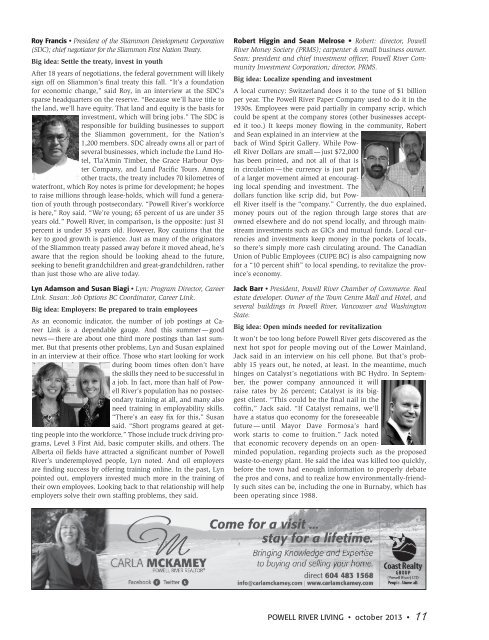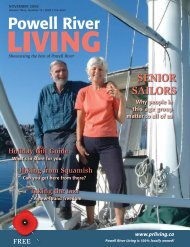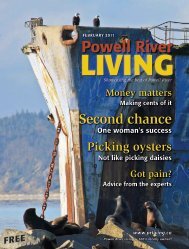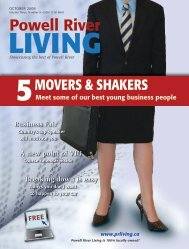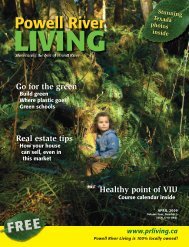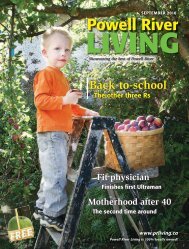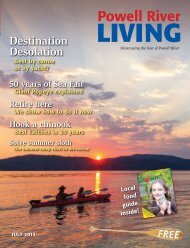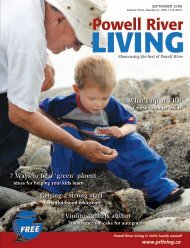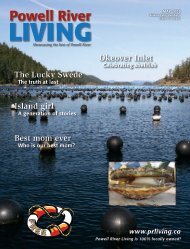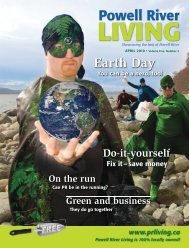RESILIENCE RENOVATIONS REVOLUTION RECONCILIATION
op for... - Powell River Living
op for... - Powell River Living
- No tags were found...
Create successful ePaper yourself
Turn your PDF publications into a flip-book with our unique Google optimized e-Paper software.
Roy Francis • President of the Sliammon Development Corporation<br />
(SDC); chief negotiator for the Sliammon First Nation Treaty.<br />
Big idea: Settle the treaty, invest in youth<br />
After 18 years of negotiations, the federal government will likely<br />
sign off on Sliammon’s final treaty this fall. “It’s a foundation<br />
for economic change,” said Roy, in an interview at the SDC’s<br />
sparse headquarters on the reserve. “Because we’ll have title to<br />
the land, we’ll have equity. That land and equity is the basis for<br />
investment, which will bring jobs.” The SDC is<br />
responsible for building businesses to support<br />
the Sliammon government, for the Nation’s<br />
1,200 members. SDC already owns all or part of<br />
several businesses, which include the Lund Hotel,<br />
Tla’Amin Timber, the Grace Harbour Oyster<br />
Company, and Lund Pacific Tours. Among<br />
other tracts, the treaty includes 70 kilometres of<br />
waterfront, which Roy notes is prime for development; he hopes<br />
to raise millions through lease-holds, which will fund a generation<br />
of youth through postsecondary. “Powell River’s workforce<br />
is here,” Roy said. “We’re young; 65 percent of us are under 35<br />
years old.” Powell River, in comparison, is the opposite: just 31<br />
percent is under 35 years old. However, Roy cautions that the<br />
key to good growth is patience. Just as many of the originators<br />
of the Sliammon treaty passed away before it moved ahead, he’s<br />
aware that the region should be looking ahead to the future,<br />
seeking to benefit grandchildren and great-grandchildren, rather<br />
than just those who are alive today.<br />
Lyn Adamson and Susan Biagi • Lyn: Program Director, Career<br />
Link. Susan: Job Options BC Coordinator, Career Link.<br />
Big idea: Employers: Be prepared to train employees<br />
As an economic indicator, the number of job postings at Career<br />
Link is a dependable gauge. And this summer — good<br />
news — there are about one third more postings than last summer.<br />
But that presents other problems, Lyn and Susan explained<br />
in an interview at their office. Those who start looking for work<br />
during boom times often don’t have<br />
the skills they need to be successful in<br />
a job. In fact, more than half of Powell<br />
River’s population has no postsecondary<br />
training at all, and many also<br />
need training in employability skills.<br />
“There’s an easy fix for this,” Susan<br />
said. “Short programs geared at getting<br />
people into the workforce.” Those include truck driving programs,<br />
Level 3 First Aid, basic computer skills, and others. The<br />
Alberta oil fields have attracted a significant number of Powell<br />
River’s underemployed people, Lyn noted. And oil employers<br />
are finding success by offering training online. In the past, Lyn<br />
pointed out, employers invested much more in the training of<br />
their own employees. Looking back to that relationship will help<br />
employers solve their own staffing problems, they said.<br />
Robert Higgin and Sean Melrose • Robert: director, Powell<br />
River Money Society (PRMS); carpenter & small business owner.<br />
Sean: president and chief investment officer, Powell River Community<br />
Investment Corporation; director, PRMS.<br />
Big idea: Localize spending and investment<br />
A local currency: Switzerland does it to the tune of $1 billion<br />
per year. The Powell River Paper Company used to do it in the<br />
1930s. Employees were paid partially in company scrip, which<br />
could be spent at the company stores (other businesses accepted<br />
it too.) It keeps money flowing in the community, Robert<br />
and Sean explained in an interview at the<br />
back of Wind Spirit Gallery. While Powell<br />
River Dollars are small — just $72,000<br />
has been printed, and not all of that is<br />
in circulation — the currency is just part<br />
of a larger movement aimed at encouraging<br />
local spending and investment. The<br />
dollars function like scrip did, but Powell<br />
River itself is the “company.” Currently, the duo explained,<br />
money pours out of the region through large stores that are<br />
owned elsewhere and do not spend locally, and through mainstream<br />
investments such as GICs and mutual funds. Local currencies<br />
and investments keep money in the pockets of locals,<br />
so there’s simply more cash circulating around. The Canadian<br />
Union of Public Employees (CUPE BC) is also campaigning now<br />
for a “10 percent shift” to local spending, to revitalize the province’s<br />
economy.<br />
Jack Barr • President, Powell River Chamber of Commerce. Real<br />
estate developer. Owner of the Town Centre Mall and Hotel, and<br />
several buildings in Powell River, Vancouver and Washington<br />
State.<br />
Big idea: Open minds needed for revitalization<br />
It won’t be too long before Powell River gets discovered as the<br />
next hot spot for people moving out of the Lower Mainland,<br />
Jack said in an interview on his cell phone. But that’s probably<br />
15 years out, he noted, at least. In the meantime, much<br />
hinges on Catalyst’s negotiations with BC Hydro. In September,<br />
the power company announced it will<br />
raise rates by 26 percent; Catalyst is its biggest<br />
client. “This could be the final nail in the<br />
coffin,” Jack said. “If Catalyst remains, we’ll<br />
have a status quo economy for the foreseeable<br />
future — until Mayor Dave Formosa’s hard<br />
work starts to come to fruition.” Jack noted<br />
that economic recovery depends on an openminded<br />
population, regarding projects such as the proposed<br />
waste-to-energy plant. He said the idea was killed too quickly,<br />
before the town had enough information to properly debate<br />
the pros and cons, and to realize how environmentally-friendly<br />
such sites can be, including the one in Burnaby, which has<br />
been operating since 1988.<br />
POWELL RIVER LIVING • october 2013 • 11


